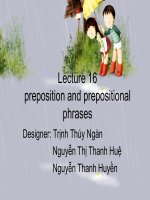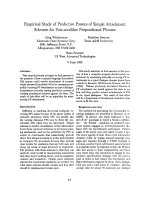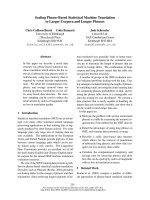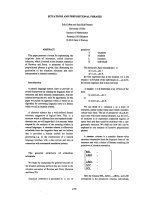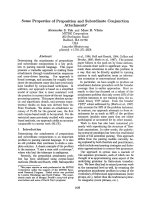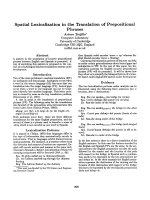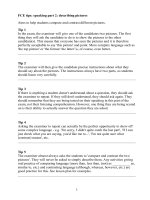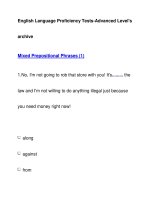preposition and prepositional phrases
Bạn đang xem bản rút gọn của tài liệu. Xem và tải ngay bản đầy đủ của tài liệu tại đây (694 KB, 27 trang )
Lecture 16
preposition and prepositional
phrases
Designer: Trịnh Thúy Ngàn
Nguyễn Thị Thanh Huệ
Nguyễn Thanh Huyền
Definition
The
preposition
The
prepositional
phrase
Simple
and
Complex
prepositions
Prepositional
adverbs
The preposition
•
Are words belonging to closed-systems items
•
Expresses a relation between two entities, one
being represented bye the prepositional
complement
•
May show the relation of place, time, instrument,
and cause
Eg: the train leaves for Hai Phong at 2 o’clock
The prepositional phrase
•
consists of a preposition followed
by a prepositional complement,
which is characteristic a noun
phrase or a Wh-clause or a V-ing
clause
•
That-clauses and infinitive clauses
do not occur as prepositional
complement
•
Other similar verbs and adjectives
are:
prep prep complement
at The bus-stop
From What he said
by Signing a peace treaty
He was surprised that she said this
>>> he was surprised at her mark/ her
saying this/what she said
decide (on), inform (of) ,insist (on)
afraid (of) , aware (of) ,sorry (about)
sure (of)
there are some circumstances in which prepositions are post-
positioned, either because the complement has to take first
position in the clause, or because it is absent:
WH-QUESTIONS : Which house did you leave it at?
RELATIVE CLAUSE : The old house which I was telling you
about.
WH-CLAUSES : What I’m convinced of is that he
will be the champion.
EXCLAMATIONS : What a mess he’s got into.
PASSIVES : She was sought after by all the leading
impresarios of the day.
INFINITIVE CLAUSES : He’s impossible to work with.
Note
Simple and complex prepositions
Simple prepositions: consist of one word.
E.g.: at, on, in, to, from, of, for, since, with, between,
under, against, up, down, by, as, etc.
Complex prepositions: consist of more than
one word, including 3 sub-groups:
Adverb of prep + prep
( along with, as for, away from, out of, up to)
Verb/adj/conjunction/etc + prep
( owing to, due to, because of )
Prep + noun + prep
( by means of, in comparison with, in front of )
Prepositional adverbs
•
A prepositional
adverb is a particle
which behaves like a
preposition with
ellipted complement
•
The prepositional
adverb is
respectively an
adjunct or a
postmodifier:
A car drove past the door (past is a preposition)
A car drove past (past is a prepositional
adverb; i.e.: past something or someone
identified in the context)
Despite the fine weather, we stayed in all day
(place adjunct)
The day before, I had spoken to him in the street
(postmodifier)
Syntactic
function
of
prepositional
phrases
(PP)
adjunct
disjunct
conjunct
Post modifier
in a N phr
Complement
of a verb
Complement
of an Adj
The people were singing on the bus
To my surprise, the doctor phoned
On the other hand, he made no attempt
to help the victim
The people on the bus were singing
We depend on you
I am sorry for his parents
Note: PP may occasionally have a nominal function
Eg: between six and seven will suit me
Subject of a clause
adjunct
disjunct
conjunct
adjunct
disjunct
Post modifier
in a N phr
conjunct
adjunct
disjunct
Complement
of a verb
Post modifier
in a N phr
conjunct
adjunct
disjunct
Complement
of an Adj
Complement
of a verb
Post modifier
in a N phr
conjunct
adjunct
disjunct
Prepositional meaning
Place (8)
Time (3)
Cause Purpose (4)
Mean Agentive (4)
Accompaniment
Support opposition
“Having”
Concession
Reference
exception
Negative condition
Subject matter
Ingredient material
Respect standard
Reaction
Place (8)
Time (3)
Cause Purpose (4)
Place (8)
Time (3)
Mean Agentive (4)
Cause Purpose (4)
Place (8)
Time (3)
Accompaniment
Mean Agentive (4)
Cause Purpose (4)
Place (8)
Time (3)
Support opposition
Accompaniment
Mean Agentive (4)
Cause Purpose (4)
Place (8)
Time (3)
“Having”
Support opposition
Accompaniment
Mean Agentive (4)
Cause Purpose (4)
Place (8)
Time (3)
Place (8)
Time (3)
Cause Purpose (4)
Place (8)
Time (3)
Mean Agentive (4)
Cause Purpose (4)
Place (8)
Time (3)
Accompaniment
Mean Agentive (4)
Cause Purpose (4)
Place (8)
Time (3)
Support opposition
Accompaniment
Mean Agentive (4)
Cause Purpose (4)
Place (8)
Time (3)
“Having”
Support opposition
Accompaniment
Mean Agentive (4)
Cause Purpose (4)
Place (8)
Time (3)
Respect standard
Reaction
Ingredient material
Respect standard
Reaction
Subject matter
Ingredient material
Respect standard
Reaction
Negative condition
Subject matter
Ingredient material
Respect standard
Reaction
exception
Negative condition
Subject matter
Ingredient material
Respect standard
Reaction
Reference
exception
Negative condition
Subject matter
Ingredient material
Respect standard
Reaction
Place (8)
Time (3)
Cause Purpose (4)
Place (8)
Time (3)
Mean Agentive (4)
Cause Purpose (4)
Place (8)
Time (3)
Accompaniment
Mean Agentive (4)
Cause Purpose (4)
Place (8)
Time (3)
Support opposition
Accompaniment
Mean Agentive (4)
Cause Purpose (4)
Place (8)
Time (3)
“Having”
Support opposition
Accompaniment
Mean Agentive (4)
Cause Purpose (4)
Place (8)
Time (3)
Reaction
“Having”
Support opposition
Accompaniment
Mean Agentive (4)
Cause Purpose (4)
Place (8)
Time (3)
Respect standard
Reaction
“Having”
Support opposition
Accompaniment
Mean Agentive (4)
Cause Purpose (4)
Place (8)
Time (3)
Ingredient material
Respect standard
Reaction
“Having”
Support opposition
Accompaniment
Mean Agentive (4)
Cause Purpose (4)
Place (8)
Time (3)
Subject matter
Ingredient material
Respect standard
Reaction
“Having”
Support opposition
Accompaniment
Mean Agentive (4)
Cause Purpose (4)
Place (8)
Time (3)
Negative condition
Subject matter
Ingredient material
Respect standard
Reaction
“Having”
Support opposition
Accompaniment
Mean Agentive (4)
Cause Purpose (4)
Place (8)
Time (3)
exception
Negative condition
Subject matter
Ingredient material
Respect standard
Reaction
“Having”
Support opposition
Accompaniment
Mean Agentive (4)
Cause Purpose (4)
Place (8)
Time (3)
Reference
exception
Negative condition
Subject matter
Ingredient material
Respect standard
Reaction
“Having”
Support opposition
Accompaniment
Mean Agentive (4)
Cause Purpose (4)
Place (8)
Time (3)
Concession
Reference
exception
Negative condition
Subject matter
Ingredient material
Respect standard
Reaction
“Having”
Support opposition
Accompaniment
Mean Agentive (4)
Cause Purpose (4)
Place (8)
Time (3)
Prepositional meaning
Place (8)
Time (3)
Cause Purpose (4)
Mean Agentive (4)
Accompaniment
Support opposition
“Having”
exception
Negative condition
Subject matter
Ingredient material
Respect standard
Reaction
Place (8)
Time (3)
Cause Purpose (4)
Place (8)
Time (3)
Mean Agentive (4)
Cause Purpose (4)
Place (8)
Time (3)
Accompaniment
Mean Agentive (4)
Cause Purpose (4)
Place (8)
Time (3)
Support opposition
Accompaniment
Mean Agentive (4)
Cause Purpose (4)
Place (8)
Time (3)
“Having”
Support opposition
Accompaniment
Mean Agentive (4)
Cause Purpose (4)
Place (8)
Time (3)
Place (8)
Time (3)
Cause Purpose (4)
Place (8)
Time (3)
Mean Agentive (4)
Cause Purpose (4)
Place (8)
Time (3)
Accompaniment
Mean Agentive (4)
Cause Purpose (4)
Place (8)
Time (3)
Support opposition
Accompaniment
Mean Agentive (4)
Cause Purpose (4)
Place (8)
Time (3)
“Having”
Support opposition
Accompaniment
Mean Agentive (4)
Cause Purpose (4)
Place (8)
Time (3)
Respect standard
Reaction
Ingredient material
Respect standard
Reaction
Subject matter
Ingredient material
Respect standard
Reaction
Negative condition
Subject matter
Ingredient material
Respect standard
Reaction
exception
Negative condition
Subject matter
Ingredient material
Respect standard
Reaction
exception
Negative condition
Subject matter
Ingredient material
Respect standard
Reaction
Place (8)
Time (3)
Cause Purpose (4)
Place (8)
Time (3)
Mean Agentive (4)
Cause Purpose (4)
Place (8)
Time (3)
Accompaniment
Mean Agentive (4)
Cause Purpose (4)
Place (8)
Time (3)
Support opposition
Accompaniment
Mean Agentive (4)
Cause Purpose (4)
Place (8)
Time (3)
“Having”
Support opposition
Accompaniment
Mean Agentive (4)
Cause Purpose (4)
Place (8)
Time (3)
Reaction
“Having”
Support opposition
Accompaniment
Mean Agentive (4)
Cause Purpose (4)
Place (8)
Time (3)
Respect standard
Reaction
“Having”
Support opposition
Accompaniment
Mean Agentive (4)
Cause Purpose (4)
Place (8)
Time (3)
Ingredient material
Respect standard
Reaction
“Having”
Support opposition
Accompaniment
Mean Agentive (4)
Cause Purpose (4)
Place (8)
Time (3)
Subject matter
Ingredient material
Respect standard
Reaction
“Having”
Support opposition
Accompaniment
Mean Agentive (4)
Cause Purpose (4)
Place (8)
Time (3)
Negative condition
Subject matter
Ingredient material
Respect standard
Reaction
“Having”
Support opposition
Accompaniment
Mean Agentive (4)
Cause Purpose (4)
Place (8)
Time (3)
exception
Negative condition
Subject matter
Ingredient material
Respect standard
Reaction
“Having”
Support opposition
Accompaniment
Mean Agentive (4)
Cause Purpose (4)
Place (8)
Time (3)
exception
Negative condition
Subject matter
Ingredient material
Respect standard
Reaction
“Having”
Support opposition
Accompaniment
Mean Agentive (4)
Cause Purpose (4)
Place (8)
Time (3)
exception
Negative condition
Subject matter
Ingredient material
Respect standard
Reaction
“Having”
Support opposition
Accompaniment
Mean Agentive (4)
Cause Purpose (4)
Place (8)
Time (3)
Concession
Prepositional meaning
Place (8)
Time (3)
Cause Purpose (4)
Mean Agentive (4)
Accompaniment
Support opposition
“Having”
exception
Negative condition
Subject matter
Ingredient material
Respect standard
Reaction
Place (8)
Time (3)
Cause Purpose (4)
Place (8)
Time (3)
Mean Agentive (4)
Cause Purpose (4)
Place (8)
Time (3)
Accompaniment
Mean Agentive (4)
Cause Purpose (4)
Place (8)
Time (3)
Support opposition
Accompaniment
Mean Agentive (4)
Cause Purpose (4)
Place (8)
Time (3)
“Having”
Support opposition
Accompaniment
Mean Agentive (4)
Cause Purpose (4)
Place (8)
Time (3)
Place (8)
Time (3)
Cause Purpose (4)
Place (8)
Time (3)
Mean Agentive (4)
Cause Purpose (4)
Place (8)
Time (3)
Accompaniment
Mean Agentive (4)
Cause Purpose (4)
Place (8)
Time (3)
Support opposition
Accompaniment
Mean Agentive (4)
Cause Purpose (4)
Place (8)
Time (3)
“Having”
Support opposition
Accompaniment
Mean Agentive (4)
Cause Purpose (4)
Place (8)
Time (3)
Respect standard
Reaction
Ingredient material
Respect standard
Reaction
Subject matter
Ingredient material
Respect standard
Reaction
Negative condition
Subject matter
Ingredient material
Respect standard
Reaction
exception
Negative condition
Subject matter
Ingredient material
Respect standard
Reaction
exception
Negative condition
Subject matter
Ingredient material
Respect standard
Reaction
Place (8)
Time (3)
Cause Purpose (4)
Place (8)
Time (3)
Mean Agentive (4)
Cause Purpose (4)
Place (8)
Time (3)
Accompaniment
Mean Agentive (4)
Cause Purpose (4)
Place (8)
Time (3)
Support opposition
Accompaniment
Mean Agentive (4)
Cause Purpose (4)
Place (8)
Time (3)
“Having”
Support opposition
Accompaniment
Mean Agentive (4)
Cause Purpose (4)
Place (8)
Time (3)
Reaction
“Having”
Support opposition
Accompaniment
Mean Agentive (4)
Cause Purpose (4)
Place (8)
Time (3)
Respect standard
Reaction
“Having”
Support opposition
Accompaniment
Mean Agentive (4)
Cause Purpose (4)
Place (8)
Time (3)
Ingredient material
Respect standard
Reaction
“Having”
Support opposition
Accompaniment
Mean Agentive (4)
Cause Purpose (4)
Place (8)
Time (3)
Subject matter
Ingredient material
Respect standard
Reaction
“Having”
Support opposition
Accompaniment
Mean Agentive (4)
Cause Purpose (4)
Place (8)
Time (3)
Negative condition
Subject matter
Ingredient material
Respect standard
Reaction
“Having”
Support opposition
Accompaniment
Mean Agentive (4)
Cause Purpose (4)
Place (8)
Time (3)
exception
Negative condition
Subject matter
Ingredient material
Respect standard
Reaction
“Having”
Support opposition
Accompaniment
Mean Agentive (4)
Cause Purpose (4)
Place (8)
Time (3)
exception
Negative condition
Subject matter
Ingredient material
Respect standard
Reaction
“Having”
Support opposition
Accompaniment
Mean Agentive (4)
Cause Purpose (4)
Place (8)
Time (3)
exception
Negative condition
Subject matter
Ingredient material
Respect standard
Reaction
“Having”
Support opposition
Accompaniment
Mean Agentive (4)
Cause Purpose (4)
Place (8)
Time (3)
Place
When we use a preposition to indicate place, we do so in relation to the
dimensional properties, whether subjectively or objectively conceived,
of the location concerned
my car is at the cottage Cottage becomes a dimensionless
location, a mere point
There is a new roof on the cottage Cottage becomes a two-
dimensional area
There are two beds in the cottage Cottage becomes a three
dimensional object
